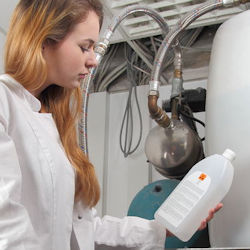Exposure to Chemicals
Research demonstrates exposure to certain chemicals, called ototoxicants, may cause hearing loss or balance problems, regardless of noise exposure.

Substances, including certain pesticides, solvents, and pharmaceuticals that contain ototoxicants can negatively affect how the ear functions, causing hearing loss, and/or affect balance.
Combined exposures to repeated loud sounds and chemicals can cause more hearing loss than exposure to either agent alone. This combination often results in hearing loss that can be temporary or permanent, depending on the level of noise, the dose of the chemical, and the duration of the exposure. This hearing impairment affects many occupations and industries, from machinists to firefighters.
Effects on Hearing
Harmful exposure to ototoxicants may occur through inhalation, ingestion, or skin absorption. Health effects caused by ototoxic chemicals vary based on exposure frequency, intensity, duration, workplace exposure to other hazards, and individual factors such as age.
Effects may be temporary or permanent, can affect hearing sensitivity, and result in a standard threshold shift. Since chemicals can affect central portions of the auditory system, not only do sounds need to be louder to be detected, but also they lose clarity.
Prevention
The first step in preventing exposure to ototoxicants is to know if they are in the workplace. One way to identify ototoxicants in the workplace is by reviewing Safety Data Sheets (SDSs). Other strategies to help prevent exposure includes:
- Providing health and safety information as well as training to workers exposed to hazardous materials, including ototoxic chemicals.
- Replacing a hazardous chemical with a less toxic chemical is an effective way to reduce exposure when ototoxicants are identified in the workplace.
- Using engineering controls, such as isolation and enclosures to control exposure to ototoxicants and noise
- Eliminating unnecessary tasks that cause noise or ototoxicant exposure, or operating noisy equipment when workers are not near.
- Using appropriate personal protective equipment (PPE) including chemical-protective gloves, arm
- sleeves, aprons, and other appropriate clothing.
When you destroy the hair cells in your ear, you destroy hearing.
Knowledge Check Choose the best answer for the question.
1-6. Which two combined exposures to repeated loud sound and chemicals can cause more hearing loss than exposure to either agent alone?
You forgot to answer the question!
